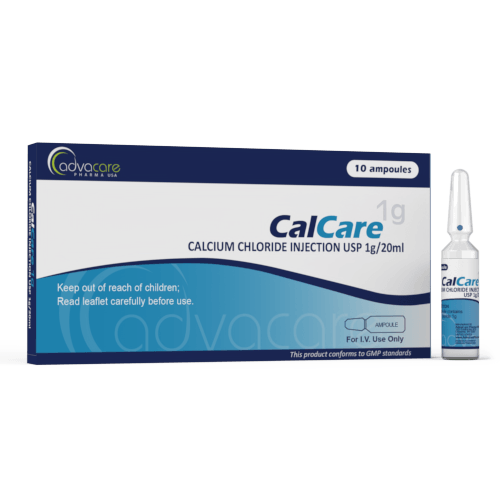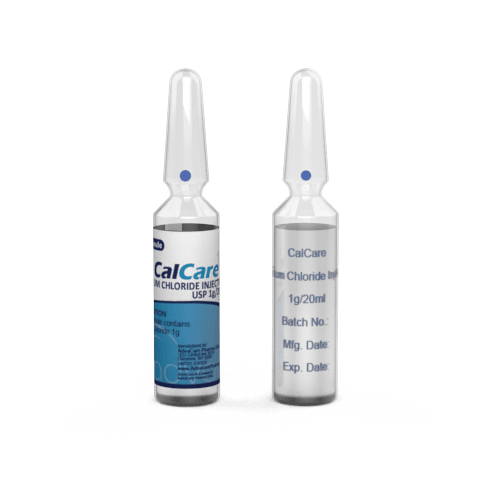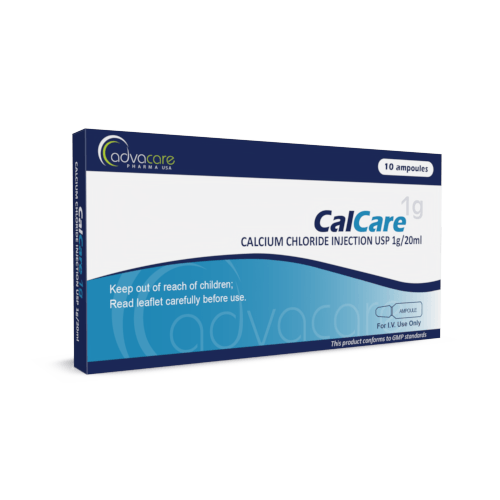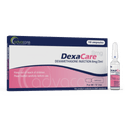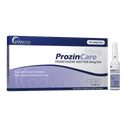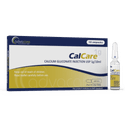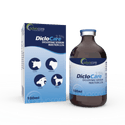- Home›
- Pharmaceuticals›
- Injections›
- Small Volume Injections›
- Calcium Chloride Injection
Calcium Chloride Injection
Dosage
Packaging
What is Calcium Chloride?
Active Ingredients: Calcium Chloride
Calcium Chloride Injection is used to raise blood calcium levels in the emergency treatment of hypocalcemia. This drug is also used to protect the heart from high potassium and magnesium levels, and it is administered for the treatment of cardiac resuscitation, arrhythmias, and hypermagnesemia.
Calcium Chloride Injections are also used to treat overdoses of channel blockers or beta-blockers. This medication is also used to treat hypocalcemic tetany in children. Calcium Chloride is used as an adjuvant in the treatment of black widow spider bites.
Calcium chloride (CaCl or CaCl₂) is an ionic compound of calcium and chlorine. Calcium is a mineral and an essential electrolyte for the body. It is a vital building block for bones and teeth, and approximately 99% of the calcium in the body is found in the skeletal tissue. This mineral also serves an essential role in many physiological processes, such as blood clotting, releasing neurotransmitters, facilitating muscle contractions, and regulating the heartbeat. During periods of increased physiological requirements, such as pregnancy or breastfeeding, the absorption of calcium is increased.
In 10mL of the 10% solution of calcium chloride, there is 272mg of elemental calcium.
AdvaCare is a GMP-certified producer of Calcium Chloride Injections. This medication is manufactured in our factories in China, India, and the USA. We routinely inspect our production facilities to ensure our products meet quality and safety standards.
Why are we a leading Calcium Chloride manufacturer?
AdvaCare Pharma, a US-owned pharmaceutical company, is a manufacturer of Calcium Chloride Injection with GMP-compliant manufacturing facilities located worldwide. We conduct frequent GMP, third-party and internal facility inspections to ensure that our manufactured injectable treatments exceed the stringent requirements of importing countries and our distributors.
As a renown Calcium Chloride manufacturer and global supplier of 120+ pharmaceutical injection products, our global reach extends to over 65 markets ensuring that pharmaceutical distributors, hospitals, pharmacies, NGOs and government institutions receive the quality-assured treatments they need.
Uses
What is Calcium Chloride used for?
It is used to treat:
- hypocalcemia (emergency treatment)
- arrhythmia
- hypermagnesemia
- hypocalcemia tetany (in children)
- beta-blocker overdose
- calcium channel overdose
- cardiopulmonary resuscitation
Though no longer recommended, calcium chloride has been administered to relieve muscle cramps caused by the bite of a black widow spider.
Is Calcium Chloride Injection the same as oral Calcium Supplements?
These two types of calcium products serve different purposes for distinct clinical situations. Calcium Chloride Injection is used in medical settings to treat conditions like hypocalcemia, cardiac arrest, and some types of life-threatening situations requiring rapid calcium supplementation. Oral calcium supplements are used for the management and prevention of conditions like osteoporosis, and mild-to-moderate hypocalcemia, or as a dietary supplement to maintain adequate calcium intake. Calcium supplements typically contain forms of calcium like calcium carbonate, calcium citrate, or calcium gluconate, and a lower concentration than that found in Calcium Chloride Injection.
What is the difference between Calcium Chloride Injection and Calcium Gluconate Injection?
Calcium Chloride Injection and Calcium Gluconate Injection are both used to treat calcium deficiency, but there are several differences in terms of their composition and specific clinical applications. Calcium Chloride Injection has a higher concentration of elemental calcium than Calcium Gluconate Injection, which means that a smaller volume of the solution is necessary to deliver the same amount of calcium. Calcium Chloride Injection is most often used for critical care settings, while Calcium Gluconate Injection is more suitable for less severe cases of hypocalcemia, as a calcium supplement during total parenteral nutrition (TPN), or for situations that require a lower risk of tissue irritation.
How are Calcium Chloride Injections used?
This medication is manufactured as a solution intended to be injected into a vein by a healthcare professional in the hospital or clinic setting. Calcium chloride should be given by slow intravenous injection, not to exceed 1mL per min, with preference for central or deep veins. This medicine should never be injected into tissues, as necrosis or sloughing may occur. If possible, the solution should be warmed to body temperature before treatment. If discomfort or adverse effects appear, the injection should be stopped until the symptoms subside before resuming therapy.
After use, any unused solution should be discarded. This product should be discarded if the solution has become cloudy or contains visible particles.
How should unused Calcium Chloride Injections be stored?
Before use, this product should be stored at room temperature, between 15-30°C.
What are the symptoms of Calcium Chloride overdose?
Excessive intake of calcium ions may lead to acute hypercalcemic syndrome. Some common symptoms include muscle weakness, extreme fatigue, uncontrollable nausea and vomiting, loss of consciousness, and sudden death in rare cases.
What dose should be given?
Calcium Chloride Injection can be given to adults and children, but caution is advised for specific groups of patients.
Adult Dosing Recommended dosage guidelines may vary depending on medical condition:
- For emergent hypocalcemia, the usual dose is 200-1000mg, administered by IV over 10-20 minutes. The maximum rate is 100mg per minute. Treatment can be repeated based on serum calcium levels.
- For hypocalcemia associated with transfusion, the usual dose is 200-500mg given with each 500mL of citrated blood.
- For life-threatening arrhythmia, the usual dose is 500-1000mg, given by IV every 10 minutes, as needed.
- For adjunct treatment of hypermagnesemia, the usual dose 500mg, is given once by IV. The rate should not exceed 100mg/min. For patients with CNS depression, the dose can be repeated as needed.
- For calcium channel blocker overdose, the usual dose is 1-2g, administered by IV over 10 mins. The dose can be repeated every 20min up to 5 times, as needed.
Pediatric Dosing Recommended dosage for children may vary based on different medical conditions:
- For emergent hypocalcemia, the usual dose is 2.7-5mg/kg per dose, administered by IV over 10-20min. The maximum rate is 100mg per minute. Treatment can be repeated based on serum calcium levels.
- For life-threatening arrhythmia associated with hypocalcemia, hyperkalemia, or hypermagnesemia, the usual dose is 20mg/kg per dose, administered IV/IO every 10 minutes, as needed. The maximum rate is 100mg per minute.
- For calcium channel blocker overdose, the usual dose is 20mg/kg per dose, administered by IV over 10 mins. The dose can be repeated every 20min up to 5 times, as needed.
Renal Dosing For emergent hypocalcemia in patients with renal impairment, the starting dose should be 2.7mg/kg per dose.
For all other indications, the lowest usual dose should be administered.
For an intravenous solution containing 10% calcium chloride (CaCl₂), there are 100mg of CaCl₂ in every mL. Within each mL, there is 27mg (1.4mEq) of elemental calcium. Doses are shown as CaCl₂ salt.
Refer to a doctor or healthcare professional for guidelines on dosage.
Pregnant or Breastfeeding Calcium chloride is considered safe to use for pregnant or breastfeeding women if there is a clear need for treatment. It is known that calcium carries across the placenta and is excreted in milk. Based on human data, there are no known risks of fetal harm, though there are not sufficient studies on the effects of this medication on these populations.
Other warnings
In patients with renal impairment, toxic levels associated may occur with long-term treatment, particularly in premature neonates.
It is important to note that this medicine must be administered slowly through a vein. Rapid admission may lead to symptoms of hyperkalemia.
The use of calcium chloride during cardiac resuscitation is controversial across industries and countries. Though modern clinical data suggested that calcium should not be used for routine cardiac arrest, in certain circumstances, such as cardiac arrest with hyperkalemia or calcium channel blocker overdose, it is still recommended. In the event of weak or inadequate contractions following defibrillation or epinephrine injection, the usual dose of 2-4mL of the calcium chloride solution, should be injected into the ventricular cavity. Special care must be taken to ensure that it is not injected into the cardiac muscle (myocardium).
Side Effects
As with all pharmaceuticals, some unwanted effects can occur from the use of Calcium Chloride Injection.
Common side effects include, but may not be limited to:
- tingling sensation in arms/legs
- change of taste in the mouth
- flushing or a feeling of heat or pressure
Serious side effects that should be reported to medical staff may include:
- hypersensitivity or allergic reactions
- changes in blood pressure (dizziness, blurry vision, lightheadedness)
- changes in heart rate
- hypercalcemia
- pain, redness, or irritation at the site of injection
- symptoms of milk-alkali syndrome (after long-term high-dose treatments)
For a comprehensive understanding of all potential side effects, consult a medical professional.
If any symptoms persist or worsen, or you notice any other symptoms, please call your doctor.
Precautions
Do NOT use Calcium Chloride Injection if:
- You are allergic to calcium chloride or any other ingredient.
- You have hypercalcemia.
- You have hypophosphatemia (low levels of phosphate in the blood).
Before treatment, consult your doctor regarding any medications you are taking to address potential drug interactions.Some known interactions exist between this medication and calcium channel blockers, bisphosphonates, thiazide diuretics (e.g. chlorothiazide, chlorthalidone, hydrochlorothiazide, indapamide, metolazone), tetracycline antibiotics, and vitamin D and its analogues.
Calcium chloride is contraindicated with ceftriaxone and digoxin. Special considerations must be taken in patients needing treatment with either of these drugs.
Due to precipitation, calcium chloride should not be combined with compounds like carbonates, phosphates, sulfates, or tartrate in parenteral mixtures.
This medication may not be suitable for people with certain conditions, so it is important to consult with a doctor if you have any health conditions. Alternative dosing, monitoring, or other considerations may be necessary for patients with conditions such as renal impairment, hypercalciuria, dehydration, vitamin D toxicity, botulism, nephrolithiasis, respiratory acidosis, and respiratory failure. Parenteral calcium therapy is contraindicated with certain conditions that are associated with hypercalcemia, hypophosphatemia, elevated levels of vitamin D, or those who have renal calculi or a history of calcium renal calculi. Injections of calcium chloride are also contraindicated for cardiac resuscitation in patients with ventricular fibrillation or those who may have digitalis toxicity.
Calcium chloride solution may contain aluminum, which could reach toxic levels during long-term treatment in patients with hepatic impairment.
References
Hemodynamic effects of calcium chloride injection following cardiopulmonary bypass: response to bolus injection and continuous infusion
This study investigates the hemodynamic impact of intravenous calcium chloride injection. It included 26 patients who were studied immediately following the cessation of extracorporeal circulation. Of these, 18 patients (Group A) received a single bolus of CaCl2, while the remaining 8 patients (Group B) received a bolus injection followed by a 10-minute infusion of CaCl2 at a rate of 1.5mg/kg/min. Parameters including myocardial contractile element velocity (Vpm), aortic blood flow, electrocardiograms, and pressures in the left ventricle, systemic arteries, pulmonary arteries, and left atrium were monitored.
The baseline ionized calcium level post-bypass was 3.6 +/- 0.6mg/100ml (normal range: 3.9 to 4.5mg/100ml). After the CaCl2 injection, this increased to 5.4 +/- 0.5mg/100ml after 1 minute. In Group A, the ionized calcium level was 4.7 +/- 0.6mg/100ml at 6 minutes post-injection, while in Group B, it reached 5.9 +/- 0.2mg/100ml at 6 minutes and 6.4 +/- 0.2mg/100ml at 10 minutes after the injection.
This study shows that early hemodynamic improvements were noted after CaCl2 injection, including increases in Vpm (p < 0.001), cardiac index (p < 0.001), mean blood pressure (p < 0.01), and stroke volume index (p < 0.001).
This study shows that both groups had a similar pattern of hemodynamic response, with cardiac index returning to control levels approximately 1-minute post-injection, while Vpm and mean blood pressure remained elevated and heart rate decreased (p < 0.01). Systemic vascular resistance gradually increased and reached significant elevation (p < 0.05) at 3 minutes in Group B and at 6 minutes in Group A.

You might be interested in...
Why AdvaCare Pharma?
As an industry leader, we are aware of our responsibility to provide affordable and sustainable solutions to improve healthcare worldwide.
